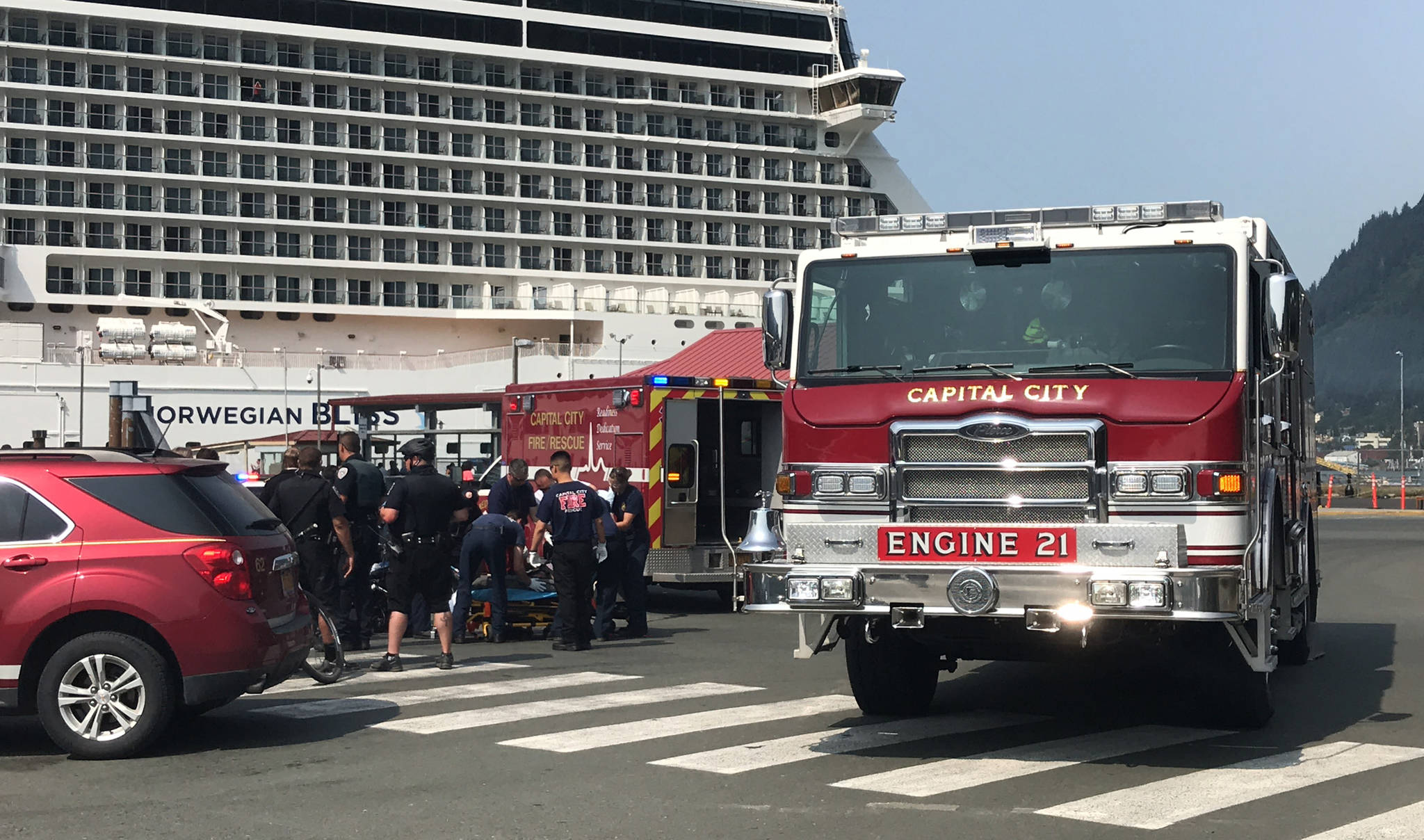Rich Etheridge knew the question was coming.
The Capital City Fire/Rescue chief was speaking at Thursday’s Juneau Chamber of Commerce luncheon and invited the attendees to ask questions. Before anyone raised their hands, he launched into an answer he’s had to give many times.
“The most common question,” Etheridge said. “‘Why does the fire engine go on medical calls?’ I’m sure a couple of you had that one. Every presentation, that’s the No. 1 question. We get emailed that question all the time.”
Since the mid-1990s, Etheridge said, fire engines have been sent on medical calls along with ambulances. He isn’t sure why exactly the change was made at the time, but he rattled off a list of reasons why the department continues to do it rather than just sending ambulances.
Mostly it relates to getting more personnel to a scene, he said. During the past 10 years, the average medical patient weighs 205 pounds, Etheridge said. Some of them might be in tough-to-reach areas and responders need more equipment to reach them. Etheridge also said there’s been an increase over the years in violent patients, so it’s better to have a couple extra responders on the scene just in case.
Responding to serious medical calls, he said, is a team effort.
“We try to treat our patients like a NASCAR pit crew,” Etheridge said.
[Fire department gets funding for another ambulance crew]
While the precautions and extra personnel are needed in many cases, Etheridge said they’re not necessary in every case. Sending the engine to every call is also costly, mostly due to the wear and tear that the vehicles undergo as they drive out to so many calls.
In the past, he said, fire engines used to be retired after 20 years and they’d have around 20,000 miles on them. Now, he said, they have a three-year-old fire engine that has around 60,000 miles on it.
Over the past year or so, CCFR officials have been looking at ways to cut down on how often they send the fire engine on medical calls. One way is simple: knowing more before they send people out to a scene.
“What we’re trying to do now is get more information from dispatch from the beginning,” Etheridge said. “If it’s a kid with a skinned knee, yeah, they just need the ambulance. If it’s somebody that’s really large or they’re in a really bad spot and we have to get them out, then they’ll need the extra personnel.”
They still send an engine out to most calls, Etheridge said. When dispatch notifies a station of a call, the captain on duty at that station then evaluates the information and can cancel a fire engine based on their judgment. Etheridge said they’re hoping to start sending the engines to fewer calls by the summer.
Etheridge explained via email that the biggest challenge is modifying the cards that dispatchers read from during their calls. A dispatch card is similar to a script, serving as a guide for a dispatcher. When someone calls, the dispatcher runs through a list of questions, and based on those questions, assigns the call to the appropriate department or station. Getting those cards and computer programs changed is not easy, Etheridge said.
“There is a tremendous amount of detail work to catch all of the glitches before going live with a program like that,” Etheridge said.
How does cruise ruling affect summer staff?
Marine passenger fee revenue — a tax that cruise ship passengers pay to stop in Juneau — funds CCFR’s seasonal ambulance. This ambulance is on duty every summer because of an increase in medical calls with so many tourists in town.
A recent court ruling puts that funding in question.
In early December, U.S. District Court Judge H. Russell Holland ruled that municipalities can only spend money they get from passenger fees on projects that benefit the physical vessel, not the passengers on board. This came as a result of a lawsuit from Cruise Lines International Association (CLIA) Alaska, which asserted that the City and Borough of Juneau had misused the funds from passenger fees.
Holland ruled that benefits to passengers are not relevant, and positions such as crossing guards (previously funded by passenger fees) would not be funded because they don’t benefit the physical cruise ships. Etheridge said the department — which gets about $230,000 per year from passenger fees to fund the seasonal employees — is in wait-and-see mode.
“Right now, our direction is status quo,” Etheridge said. “We’re currently funded through June. Things could change at any minute, but right now with the interpretation that the city managers have, we plan on business as usual for the marine passenger fee for those seasonal positions.”
Glacier area still the busiest for rescue calls
The disappearance of the ice caves at the Mendenhall Glacier might be bad for people looking to get a cool photo for their Instagram account, but it’s been a positive development for people’s safety, Etheridge said. The West Glacier Trail is a hotspot for rescues, he said, but calls have dropped quite a bit since the popular ice caves disappeared last year.
Even with that decrease, the glacier area — West Glacier Trail, Mendenhall Lake and Mendenhall River — is still the busiest area for rescues. Just this week, CCFR went out to the lake to assist a biker who had fallen through the ice.
“(In) our backyard, we get really comfortable with it and we underestimate the hazards out there or we overestimate our abilities,” Etheridge said.
• Contact reporter Alex McCarthy at 523-2271 or amccarthy@juneauempire.com. Follow him on Twitter at @akmccarthy.

